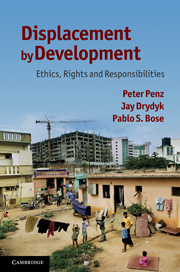11 - Narmada revisited
Published online by Cambridge University Press: 05 June 2012
Summary
This volume argues that an approach rooted in development ethics offers a fresh and potentially innovative perspective to many of the dilemmas that development-induced displacement presents. Previous chapters have demonstrated just how thorny these dilemmas are; in particular, attempts to avoid the potential harms of displacement without blocking strategies that constitute what might be considered ‘good’ development goals. We provided a way of defining the phenomenon of displacement in relation to development, highlighting the importance of recognizing with all its complexities indirect as well as direct forms of displacement, and engaging with the issue of coercion – the question of the involuntary nature of the process. We then showed how the public-interest test of cost–benefit analysis deals with displacement by development and, by dealing with compensation as only hypothetical, neglects the issue of justice. Several of the existing and emerging policy guidelines that are meant to address this deficiency we then reviewed. In doing so we found a shift from a broadly utilitarian towards a rights-based approach to displacement by development, but also gaps in these existing policy frameworks and principles. We then turned to a development ethics-focused approach to displacement by development and did so by examining the normative assumptions and ethical positions that have been articulated in relation to ideals of good development, before applying these to justifiable outcomes from displacement by development and to justifiable processes for doing so.
- Type
- Chapter
- Information
- Displacement by DevelopmentEthics, Rights and Responsibilities, pp. 263 - 287Publisher: Cambridge University PressPrint publication year: 2011

